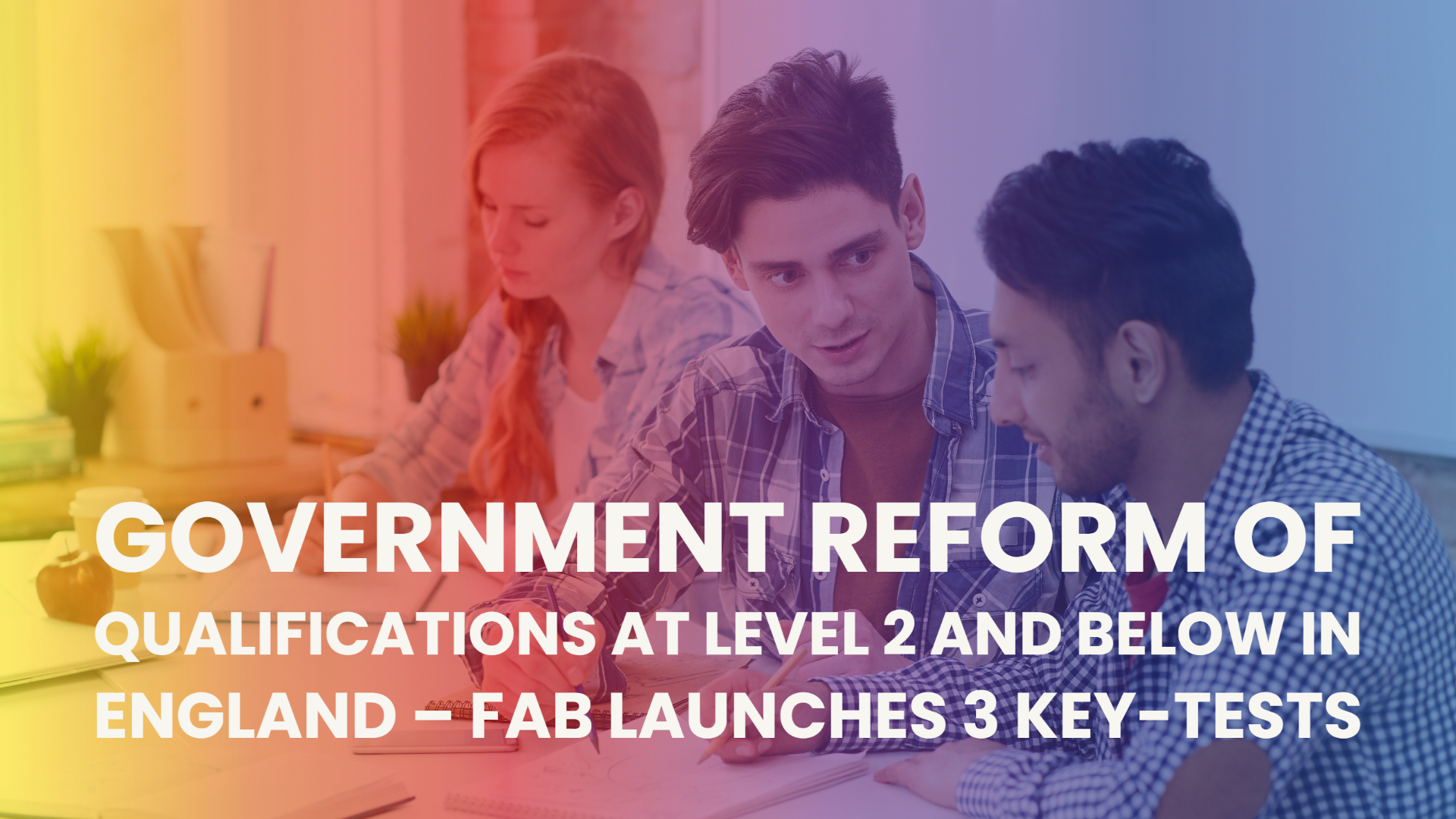3 Key-Tests for Government reform of qualifications at Level 2 and below

In response to the Department for Education’s latest consultation document on qualifications reform at Level 2 and below, the Federation will continue engaging with its members and policymakers to apply 3-Key-Tests:
- Will these proposals provide real ladders of opportunity for both young people and adults to progress and climb the qualifications pyramid?
- Will reform of the system result in less complexity and bureaucracy in post-16 provision in future?
- Will local communities, students and parents be able to exercise greater choice in future to meet specific skills needs; to tackle disadvantage and level-up opportunity across the country?

1. Opportunity
The government’s own impact assessment[1] at the time of launching these reforms admitted they would be detrimental to disadvantaged learners. It’s hard to see how this has changed.
Research by independent think-tanks and others have evidenced the real value that entry-level, Level 1 and Level 2 qualifications provide. For example, the Learning and Work Institute found that the ‘social return’ for every £1 invested in entry-level qualifications is £22 for the exchequer.[2]
With 16 million people still struggling with basic literacy and numeracy; including stagnating productivity rates since 2008; England needs to continue to ensure the broadest possible base of a qualifications’ pyramid.
2. Bureaucracy
These reforms epitomise the ‘Whitehall knows best’ ideology that has come to dominate skills policy development in the last decade.
Instead of allowing a healthy, competitive marketplace for qualifications – robustly and independently regulated by a single statutory regulator – the government has decided that civil servants are a better arbiter of quality and choice than learners or employers.
Our recent ‘Feel the Weight’ report[3] documented the exponential rise of regulation and red-tape since 2014. With the advent of two qualifications regulators in England (Ofqual and the Institute), the compliance costs of meeting regulation for FAB’s members are easily expected to exceed £6 million per annum.
Increases in bureaucracy ultimately crowd out innovation and investment in the learning experience. They are responsible for a low-trust culture that undermines those at the delivery end of the post-16 skills ecosystem: providers and tutors.
Like the government’s apprenticeship reforms to date, these proposals run the risk of costing more and delivering less. And it is taxpayers who will be asked to pick up the tab.
3. Choice
The government deploys euphemisms like ‘streamlining the post-16 qualifications system.’
What it really means is that providing less choice for college leaders, course tutors and students is in itself the overarching aim of these reforms. It’s part of an agenda to nationalise the system, provide increased direction from the centre; and to allow more monopolistic practices to emerge.
For 16-19-year-olds that will mean narrowly funnelling young people from entry-level qualifications into government approved pathways that may or may not meet their needs. For adults, it means less flexibility than is currently the case.
As the Policy Exchange warned in its recent report[4], written by the vice-chair of the government’s social mobility commission, Alun Francis: the government is in danger of trying to developing a ‘one size fits all’ approach; when the complexity of local areas and labour markets demands a model that is far more agile and responsive.
The public is also concerned about the attack on student choice, with over 100,000 people recently signing a Parliamentary petition.[5]
Commenting on the release of the 3 Key Tests and the government latest proposals, the Federation’s chief executive, Tom Bewick, said:
“We look forward to engaging in the latest consultation detailing the next stages in qualifications reform at Level 2 and below.
“As we’ve said all along, we share the same aim of the government in ensuring a truly world-class post-16 qualifications and skills system by 2030.
“Our three key tests for these ongoing reforms, therefore, will help focus minds on what is really important in terms of any final decisions about the future of these qualifications that are being made by the Department for Education: i.e. will the reformed system create more opportunity for people; reduce bureaucracy; and ensure that market choice remains a central tenet of the system for post-16 learners in future?
“If the government’s proposals achieve these goals we might be able to look back in 2027 (when the reforms are expected to be fully implemented) and say that over a decade long upheaval in the funding and regulation of qualifications was well worth it.
“If what we see, however, is less opportunity for young people and adults; increases in bureaucracy and student choice undermined by restrictive provider practices, then it would have been yet another lost decade of idealistic intent on skills policy followed by failed delivery.
“The country really can’t afford for that to happen.”
[1] ‘Review of Post-16 qualifications at Level 3 in England: government consultation response and impact assessment’ (July 2021)
[2] ‘Getting the basics right: The case for action on adult basic skills’ (2021) Learning & Work Institute
[3] ‘Feel the Weight: Regulatory Impact in Awarding’ (2022) Federation of Awarding Bodies
[4] ‘Rethinking social mobility for the levelling up era’ (2021) London: Policy Exchange
[5] Protect Student Choice petition closes with 108,302 signatures











Responses